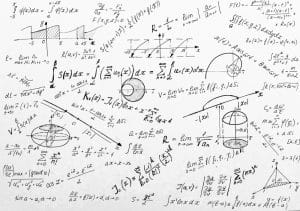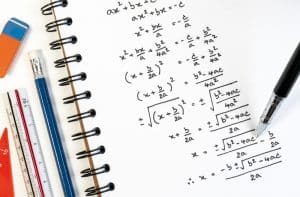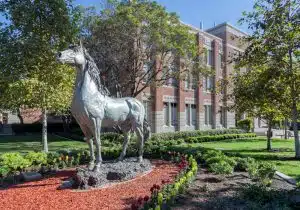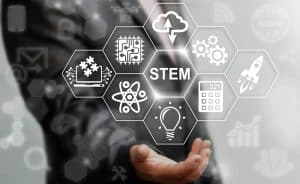Della Pietra High School Applied Math Program
Starting your high school journey brings numerous opportunities, especially for those of you who are interested in mathematics. The Della Pietra High School Applied Math Program is an excellent choice for students eager to explore advanced mathematics. It offers a unique mix of challenging and innovative learning experiences. In this blog, we’ll take a closer look at what this program has to offer and how it can be a significant part of your journey in mathematics.
What is the Della Pietra High School Applied Math Program?
The Della Pietra High School Applied Math Program, established through a generous $500,000 gift from Stephen and Vincent Della Pietra and their wives, Pamela Hurst-Della Pietra and Barbara Amonson, is a distinctive initiative at Stony Brook University.
Recognizing the growing demand for professionals in science, technology, engineering, and math (STEM) fields, the program aims to nurture and advance the skills of gifted high school students in mathematics.
Launched in Fall 2014, the program has become a hub for Long Island’s top high school students excelling in math and science. It offers three-hour Saturday classes led by Stony Brook faculty and graduate students, delving into various mathematical concepts such as game theory, linear programming, financial and economics mathematics, relativity, and more. These sessions are designed not only to challenge students but also to foster a deeper understanding of how mathematics applies to different fields.
Participants, a balanced mix of young women and men, join the program for reasons ranging from a desire to explore college-level concepts to a curiosity about the real-world applications of math. The program’s structure encourages individual and group projects, engaging students in rigorous mathematics through games, puzzles, and competitions.
The Della Pietra Program stands out for its commitment to advancing STEM knowledge and inspiring future mathematicians. It provides an enriching environment where students can connect their academic learnings to practical applications and leverage their program experience to become a national semifinalist in competitions such as the Siemens Competition in Math, Science & Technology.
Stony Brook University’s reputation for excellence in mathematics, with its faculty members receiving prestigious awards like the Abel Prize and Fields Medal, further enhances the program’s credibility. The Della Pietra family’s philanthropic efforts extend beyond this program, contributing significantly to STEM education and other areas at Stony Brook University, thereby reinforcing the university’s status as a top public research institution.
Topics Covered at the Della Pietra High School Applied Math Program
In a typical semester of the program, students engage with a diverse array of topics in applied mathematics, each offering unique insights and skills:
Game Theory
This area focuses on the study of strategic interactions where the outcome for each participant depends on their decisions and those of others. Students learn how to analyze various games, from simple board games to complex business and economic scenarios, understanding how to predict and strategize behaviors and outcomes in competitive situations.
Optimization
In this segment, students explore techniques to find the best possible solution among various choices, given certain constraints. This is particularly useful in areas like resource allocation, logistics, and schedule planning. They learn how to formulate real-world problems into mathematical models and solve them efficiently.
Mathematics of Puzzles and Games
Here, students investigate the mathematical structures and principles underlying puzzles and games. This not only enhances problem-solving skills but also brings a playful and engaging approach to learning complex mathematical concepts, encouraging creativity and lateral thinking.
Computer Modeling
This aspect teaches students how to use computers to simulate and analyze real-world phenomena. It covers creating algorithms and models to predict weather patterns, design engineering structures, or understand financial markets. Students learn the importance of accuracy in data input and the interpretation of output results.
Introduction to the Mathematics of Finance
This introductory course provides a foundational understanding of how mathematical theories and models are applied in finance. Topics might include interest rates, investment risk analysis, and financial market behavior. It’s a stepping stone for those interested in careers in finance, economics, or actuarial science.
In addition to these theoretical concepts, practical skills in software tools like EXCEL and/or MAPLE are emphasized. EXCEL is widely used for data analysis, budgeting, and financial modeling, making it a versatile tool in many fields.
MAPLE, on the other hand, is powerful in solving complex mathematical problems visualizing mathematical functions and is invaluable in fields like engineering and physics. These tools are crucial for students aiming for higher studies or careers in Business, Mathematics, Physics, Engineering, or Economics, providing them with hands-on experience that blends theoretical knowledge with real-world application.
Why Should You Join the Della Pietra High School Applied Math Program?
Joining this program is more than just enhancing your mathematical skills. You will be a part of a community that values creativity, critical thinking, and collaboration. This program will equip you with the tools to tackle contemporary issues using mathematical models, preparing you for college and for a future as an innovative problem solver.
Math Circle
A Math Circle is a dynamic and engaging forum where students and professors gather to explore and learn mathematics. This approach is both innovative and enjoyable, creating an environment where participants can delve into new mathematical topics, share their enthusiasm for mathematics, and enjoy the learning process together.
These Math Circles are found worldwide, and Stony Brook University has now joined this global community by establishing its own. At Stony Brook’s Math Circle, students get the chance to interact with peers who have similar interests in mathematics, fostering a sense of community and collaboration. It’s a space where ideas are exchanged, challenging problems are tackled, and the joy of discovering mathematical concepts is shared.
Participating in a Math Circle is more than just learning about numbers and equations; it’s about being part of an active learning community. This experience allows students to see mathematics from different perspectives, encourages them to think critically, and enhances their problem-solving skills in a fun and supportive environment.
How Do You Get Into the Della Pietra High School Applied Math Program?
The Della Pietra High School Applied Math Program is accessible to students who are in their freshman year of high school or higher. The program welcomes applications from students who have completed their eighth grade and are currently enrolled in high school, starting from the freshman year onwards.
How Do I Apply to the Della Pietra High School Applied Math Program?
Applying is a straightforward process. Start by visiting the program’s website to access the application form. You’ll need to submit your academic transcripts, a personal essay that reflects your interest in applied mathematics, and letters of recommendation. Ensure that every component of your application is a reflection of your dedication and capabilities.
Applying to the Della Pietra High School Applied Math Program at Stony Brook University is a straightforward process, but it’s important to be prepared and complete it in one sitting. Here’s a step-by-step guide to help you through the application:
I. Required Documents
- Prepare an essay explaining why you want to attend the program. Save the file in PDF format with the name “Lastname Firstname Essay.”
- Have a copy of your transcripts ready to upload.
- Ensure you have a digital copy of your latest report card.
- If you are applying for a scholarship, get a letter from your school district or a letter stating your eligibility for the free or reduced lunch program. This must be on official letterhead.
II. Fill in Your Personal Details
- Enter your first and last name.
- Provide your complete mailing address, including street, city, state, and zip code.
- Add your phone number and email address.
- Include your parent’s email address for additional contact.
- Select your gender (Male/Female).
- Enter your date of birth in the format MM/DD/YEAR.
- Specify the high school you are currently attending and your expected year of graduation.
- Choose your tee-shirt size (Small, Medium, Large, XLarge).
III. Select the Session
Indicate which semester you wish to attend. For example, for Spring 2024, the dates are February 10, 24, March 2, 9, and 16. The cost is $450 per semester.
A. Scholarship Application (If Applicable)
If you are eligible for a scholarship, upload the required letter confirming your eligibility for the Federal free or reduced lunch program. Remember, this document is essential for scholarship consideration.
B. Upload Your Documents
Upload your essay, transcript, report card, and (if applicable) free or reduced lunch letter. Make sure each document is correctly named and in the correct format.
C. Review and Submit
Before submitting, double-check all the information and attachments for accuracy. Complete the application in one sitting to avoid any data loss.
Remember to ensure that all attachments are ready before starting the application to make the process smoother. Once you have completed these steps, you can submit your application, taking you one step closer to joining the Della Pietra High School Applied Math Program!
How Hard is Getting into the Della Pietra High School Applied Math Program?
Gaining entry into the program is quite challenging due to its competitive nature and the limited number of spots available. The selection of applicants is based on a comprehensive review of every part of the application.
This means that every element you submit, from your essay to your transcripts and report card, plays a crucial role in the decision-making process. The program’s admissions team looks at the complete picture each application presents to choose the most suitable candidates.
Best Extracurriculars for Della Pietra High School Applied Math Program: What Activities Help You Get In?
To increase your chances of being accepted into the Della Pietra High School Applied Math Program, it’s essential to engage in extracurricular activities that demonstrate your passion for mathematics and your dedication to academic excellence. Here are some ideal extracurriculars and projects that aspiring attendees can consider:
Math Competitions: Engaging in math competitions like the AMC (American Mathematics Competitions), AIME (American Invitational Mathematics Examination), or local math contests is a great way to demonstrate your math prowess and your talent for solving challenging problems. These competitions highlight your mathematical skills and your ability to tackle complex math challenges with confidence.
Math Clubs: Consider becoming a member or even founding a math club at your school. Getting involved in a math club, whether as an active participant or a leader, showcases your passion for all things math and your readiness to work together with fellow students. It’s an opportunity to demonstrate your enthusiasm for math-related endeavors and your willingness to collaborate and share knowledge with your peers.
Independent Research: Take on independent research ventures in mathematics or related areas. This might entail delving into math concepts that go beyond what you learn in your regular school coursework or collaborating on a research project with a math teacher. It’s a chance to embark on self-directed exploration and deepen your understanding of mathematical concepts, which can be a valuable addition to your academic journey.
STEM Programs: Consider enrolling in STEM (Science, Technology, Engineering, and Mathematics) programs or attending STEM camps, either during the summer or throughout the school year. These programs frequently offer advanced math classes and provide practical, hands-on exposure to various STEM subjects. By participating in such programs, you can gain deeper insights into mathematics and explore STEM disciplines more thoroughly, enhancing your overall knowledge and skills.
Coding and Programming: Explore coding languages such as Python and engage in coding competitions. Proficiency in coding and programming is exceptionally pertinent in the realm of applied mathematics and scientific computing. Acquiring these skills not only enriches your mathematical toolkit but also prepares you for tackling complex problems in various scientific and mathematical domains.
Science Olympiads: Get involved in science olympiads, such as Physics, Chemistry, or Biology competitions. Achieving success in these contests showcases your ability to utilize mathematical concepts to solve practical, real-world scientific challenges. It underscores your capacity to apply mathematical principles to a diverse range of scientific problems, highlighting your well-rounded skills in both math and science.
Community Service: Participate in community service initiatives that include math tutoring or mentoring. Assisting others in improving their math abilities not only highlights your proficiency but also underscores your dedication to education. It’s a meaningful way to give back to your community while demonstrating your passion for math and your willingness to support others in their learning journey.
Math-related Projects: Take the initiative to start math-related projects or activities within your school or local community. For instance, you could organize math workshops, math-themed fairs, or fundraising events centered around math.
These efforts showcase not only your passion for mathematics but also your leadership and organizational skills. They provide opportunities for others to engage with math in a fun and educational way, further emphasizing your commitment to promoting mathematical literacy.
Advanced Math Courses: If your school provides advanced math classes, think about enrolling in them to push your limits and enhance your understanding of mathematics. These courses offer a chance to explore more complex mathematical concepts and expand your mathematical horizons.
By taking on these challenges, you will demonstrate your dedication to learning and acquire valuable mathematical skills that can benefit you in programs like the Della Pietra High School Applied Math Program.
Online Math Resources: Dive into online math resources like Khan Academy, Coursera, or edX to complement your math studies and explore more advanced topics. These platforms provide a wealth of educational materials that can help you expand your mathematical knowledge beyond what’s covered in your regular classes. With these resources, you have the opportunity to delve deeper into math and prepare yourself for programs like the Della Pietra High School Applied Math Program.
Remember that quality matters more than quantity when it comes to extracurricular activities! It’s important to choose activities that genuinely interest you and align with your passion for mathematics. Highlight your achievements and experiences in your application to showcase your dedication to the field.
When is the Deadline to Apply to the Della Pietra High School Applied Math Program?
The program accepts applications continuously, following a rolling admissions process, until all available spots are filled. There is no strict deadline for submitting your application; however, it’s important to apply as early as possible.
Once the program reaches its capacity, no further applications will be considered, regardless of the original closing date.
When Do I Find Out About My Application to the Della Pietra High School Applied Math Program?
The Della Pietra High School Applied Math Program at Stony Brook University operates on a rolling admissions process, continuing to accept applications until all available spots are filled.
Consequently, applicants will be notified about the status of their application after the program has reached total capacity, and all received applications have been thoroughly reviewed.
Where is the Della Pietra High School Applied Math Program Held?
The Della Pietra High School Applied Math Program is conducted online. Sessions are held every Saturday from 10:30 am to 1:30 pm.
This online format allows students to participate in the program from their own homes or any location with internet access, making it convenient and accessible.
When Does the Della Pietra High School Applied Math Program Take Place?
For the Spring Semester of 2024, the program offers a series of classes, with each class focusing on a different topic. The semester is scheduled to have classes on the following dates: February 10th and 24th and March 2nd, 9th, and 16th.
This structure allows students to explore a wide range of subjects, with each class dedicated to introducing and delving into a new area of study.
How Long is the Della Pietra High School Applied Math Program?
The Della Pietra High School Applied Math Program runs for one semester. Each session lasts for three hours, during which students engage in an in-depth exploration of various areas within applied mathematics.
This will give participants a comprehensive understanding of how mathematics is used in practical scenarios. During these sessions, students have the opportunity to work both individually and in groups. This collaborative and individual work structure allows them to delve deeper into specific mathematical topics.
By working on projects, they can apply the concepts they learn in real-time, enhancing their grasp of the material. These projects serve as a practical platform for students to experiment with mathematical theories, see their real-world applications, and develop a stronger foundation in the subject.
This format is particularly effective in fostering a deep and practical understanding of mathematics. It encourages students to think critically and creatively, solving problems and discussing ideas within a collaborative learning environment.
The remote nature of the program also adds an element of flexibility, enabling students to participate in their own environments while still being part of an interactive and engaging educational experience.
Tips for Learning Effectively in Short Courses Like the Della Pietra High School Applied Math Program
To make the most of learning in summer programs, especially in brief educational courses such as the Della Pietra High School Applied Math Program, it’s important to have a well-planned approach. These programs, though brief, can offer immense educational value if approached correctly. Here are some strategies to help you gain the most from these experiences:
1. Be Fully Involved
It’s important to take an active role in every session of the program. This means not just listening but also asking questions, adding your thoughts to group discussions, and participating in any group activities. When you actively engage like this, you not only learn more effectively, but you also tend to remember the information better. This kind of involvement makes the learning process more interactive and enriching.
2. Keep Practicing Regularly
In the Della Pietra High School Applied Math Program, it’s important to work on the given assignments and projects consistently. This regular practice is key to fully understanding the challenging mathematical concepts taught in the program.
As you keep practicing, you’ll find that not only do these complex ideas start to make more sense, but your overall mathematical skills will also improve step by step. Each assignment and project is an opportunity to deepen your knowledge and enhance your abilities, so making the most of these tasks can significantly boost your learning experience in the program.
3. Create Connections
It’s beneficial to form connections with both your fellow students and the instructors. Networking within the program not only offers immediate support and assistance with your studies but also lays the foundation for long-term professional relationships.
These connections can become valuable resources and contacts in your future academic or career endeavors, offering advice, opportunities, and collaboration in the field of mathematics. Building this network can be a crucial part of your overall experience and growth in the program.
4. Seek Feedback
It’s important to frequently seek out your instructors’ opinions on how you’re doing. Asking for their feedback gives you insights into your progress and areas where you can improve. Constructive criticism from these experts can be a valuable guide in your learning journey, helping you to identify both strengths and weaknesses in your understanding of applied mathematics. This continuous feedback loop is essential for enhancing your skills and knowledge throughout the program.
5. Time Management
Find a good balance between your program commitments and other summer activities. Effective time management is key here. It helps you avoid feeling too overwhelmed or stressed. By organizing your schedule well, you ensure that you have enough time for both your studies in the program and any leisure activities or personal commitments you might have during the summer. This balance is important not just for keeping up with the program’s workload, but also for making sure that you can truly enjoy and make the most of your learning experience.
6. Reflect on Learning
Spend a few moments reflecting on what you’ve learned after each class. This means thinking back over the session’s content, considering what stood out to you, and how the concepts connect to what you already know or to real-world situations.
This practice of reflection is a powerful tool for reinforcing and solidifying your understanding of the mathematical concepts covered. It not only helps in better retaining the new information but also in gaining a deeper comprehension of how these ideas fit into the larger picture of applied mathematics.
7. Apply Learning to Real-life Scenarios
A key part of your learning experience is to understand how the mathematical concepts you’re studying apply outside the classroom. Whenever you learn a new theory or solve a problem, think about how it can be used in everyday life or in various professional fields.
This approach of connecting classroom learning to practical scenarios not only strengthens your grasp of the subject but also adds more significance and relevance to what you’re learning. Seeing the real-world applications of mathematical concepts can be incredibly motivating and insightful, showing you the true value and impact of your studies.
8. Maintain a Curious Mindset
Stay curious and open to new ideas. Don’t limit yourself to just what is taught in the sessions; instead, take the initiative to explore more. Look for additional resources, such as books, online materials, or even math-related documentaries and articles that go beyond the program’s curriculum.
This extra exploration can greatly enhance your understanding of the topics covered and make your learning experience more comprehensive and enjoyable. Keeping a curious and exploratory attitude will not only deepen your knowledge of applied mathematics but also keep you engaged and excited about the subject.
9. Keep Up With Your Learning
Once the Della Pietra High School Applied Math Program concludes, it’s important to continue engaging with the material you learned. Regularly going over your notes helps refresh your memory and solidify your understanding of the concepts.
Being updated on the latest developments in mathematics, whether through reading, online courses, or academic journals, will help you stay connected to the field. Participating in activities like a Math Circle or math clubs can also be a great way to maintain and sharpen the skills you developed during the program. These follow-up activities ensure that the knowledge and skills you gained are not only retained but also continually expanded upon.
By implementing these strategies, you can extract maximum benefit from short-term educational programs like the Della Pietra High School Applied Math Program, turning a brief educational experience into a substantial and lasting learning opportunity.
How Can the Della Pietra High School Applied Math Program Help You Get Into College?
The Della Pietra High School Applied Math Program can significantly enhance your college admissions experience in several ways:
Being a part of the Della Pietra High School Applied Math Program can really make your college application stand out. It tells college admissions teams that you’re not only interested in math but also skilled at it.
By taking part in this advanced program, you’re showing that you’re willing to take on more challenging and specialized work than what’s typically offered in high school. This extra effort demonstrates your dedication to your studies and your willingness to push yourself academically.
The Della Pietra High School Applied Math Program gives you a chance to learn things that you usually wouldn’t in a regular high school class. These advanced lessons offer a unique learning experience. When you include this in your college application, it really catches the attention of admissions officers. It shows them that you’re someone who seeks out new learning challenges and is serious about growing and improving yourself academically!
Colleges highly appreciate students who demonstrate excellent critical thinking and analytical skills. In the Della Pietra High School Applied Math Program, these skills take center stage, especially in the context of applied mathematics.
The great thing is that these abilities aren’t limited to just math; they spill over into various academic fields. So, the program doesn’t just prepare you for math-related careers, but it also equips you with valuable thinking tools that can benefit you in a wide range of subjects and professions.
Getting to know your instructors and fellow students in the Della Pietra High School Applied Math Program is also a chance to build a supportive community. The connections you make here can be precious!
Your instructors and peers can become mentors and friends who may offer recommendations or provide advice that can be really useful when you’re applying to college. Being part of such a network can make the college application process feel less daunting, knowing that you have a group of people who have your back and can guide you along the way.
Successfully managing the responsibilities of the Della Pietra High School Applied Math Program alongside your regular high school coursework is a clear indicator of your excellent time management abilities and unwavering commitment to your academics.
When colleges see this on your application, they understand that you can efficiently handle multiple tasks and remain dedicated to your educational goals. It showcases your capacity to prioritize your studies and excel in challenging academic environments, a quality highly respected by admissions teams. This demonstration of time management and commitment can set you apart as a well-prepared and dedicated college candidate.
It’s worth noting that specific colleges might reward you for your advanced coursework in programs like the Della Pietra High School Applied Math Program. This can include getting college credit for the work you’ve done or receiving special recognition. Such recognition can give your academic profile a boost right from the beginning of your college education.
Lastly, your active involvement in this program is clear proof that you’re a self-motivated individual who takes the initiative to pursue your interests. These are qualities that colleges really appreciate in applicants.
They want students who are eager to learn, driven to excel, and willing to take the lead in their educational journeys. Your participation in this program highlights your proactive nature and your commitment to personal and academic growth, which are qualities that can make your college application shine.
Planning for College After the Della Pietra High School Applied Math Program
If you’re considering the Della Pietra High School Applied Math Program as a pre-college experience, you’re likely interested in pursuing a college education in a math-related field. Here’s some guidance on undergraduate degree programs to explore after completing the program:
Mathematics
One of the most straightforward options is to pursue a Bachelor of Science (B.S.) or Bachelor of Arts (B.A.) degree in Mathematics. This program will provide you with an in-depth exploration of mathematical theory and its practical applications.
You’ll study various branches of mathematics, including calculus, algebra, and statistics, preparing you for careers in fields like data analysis, research, or teaching mathematics at the high school level. You may have the opportunity to specialize in areas like pure mathematics, applied mathematics, or mathematical modeling, depending on your interests and career goals.
Applied Mathematics
If your goal is to use mathematical principles to tackle practical, real-world challenges, consider enrolling in an Applied Mathematics program. This program is designed to equip you with the skills needed to apply mathematical concepts to solve a wide range of real-world problems. In addition to studying advanced mathematical theory, you’ll also delve into subjects like physics, engineering, and computer science.
For example, you might explore how mathematical modeling can be used to analyze the behavior of physical systems, optimize engineering processes, or develop algorithms for computer applications. This degree opens doors to careers in industries like engineering, data science, financial modeling, and scientific research, where strong analytical and problem-solving skills are highly valued.
Statistics
Statistics is the science of data analysis, and pursuing a degree in Statistics can be a wise choice. This program focuses on developing your abilities to collect, analyze, and interpret data effectively. In a Statistics degree program, you’ll gain valuable skills in statistical methods, data modeling, and data-driven decision-making.
These skills are highly sought after in a wide range of industries, including finance, healthcare, marketing, and social sciences. For example, you might study how to design experiments, conduct surveys, and use statistical software to extract meaningful insights from data. Graduates with a degree in Statistics are well-prepared for careers as data analysts, statisticians, market researchers, and more, where the ability to work with data is crucial for making informed decisions and solving complex problems.
Computer Science
Pursuing a Computer Science degree offers you the opportunity to blend your mathematical abilities with programming expertise. This combination of skills can unlock a wide range of career possibilities, including roles in software development, artificial intelligence, and data science.
In a Computer Science program, you’ll delve into the world of algorithms, coding languages, and software engineering. For instance, you might study how to design and develop computer programs, create algorithms to solve complex problems and work on projects that involve machine learning and data analysis.
Graduates with a Computer Science degree are in high demand in industries such as technology, finance, healthcare, and entertainment, where proficiency in programming and computational thinking is essential. This degree can lead to roles as software engineers, data scientists, web developers, and more, allowing you to apply your mathematical and computational skills in practical and innovative ways.
Engineering
If you’re interested in applying your strong mathematical foundation to design and construct systems and structures, consider pursuing an Engineering degree. There are various branches of Engineering to choose from, such as Mechanical Engineering or Electrical Engineering, and they all require rigorous mathematical coursework.
These programs prepare you for careers where you’ll use your mathematical and scientific knowledge to solve practical problems and create innovative solutions. For instance, in Mechanical Engineering, you’ll study topics like thermodynamics, fluid mechanics, and materials science, all of which rely heavily on mathematical principles.
Similarly, Electrical Engineering involves mathematical concepts in areas like circuit analysis, electromagnetic fields, and digital signal processing. With an Engineering degree, you’ll have the skills to work on projects ranging from designing mechanical systems and electronics to developing sustainable energy solutions and infrastructure.
This degree path opens doors to careers in industries like aerospace, automotive, energy, and electronics, where you can make a tangible impact by applying your mathematical and engineering expertise.
Physics
If you have a strong affinity for mathematics and a curiosity about the fundamental principles that govern the physical world, a Bachelor’s degree in Physics could be an excellent choice. Physics is a closely related field that delves deep into the mathematical foundations of the natural world.
In a Physics program, you’ll have the opportunity to study various branches of physics, such as classical mechanics, electromagnetism, thermodynamics, and quantum mechanics. These areas heavily rely on mathematical concepts to describe and explain the behavior of matter and energy in the universe.
For example, in classical mechanics, you’ll use mathematical equations to understand how objects move and interact with each other. In electromagnetism, you’ll explore the mathematical relationships that govern the behavior of electric and magnetic fields.
Quantum mechanics, one of the most fascinating and mathematically intensive branches of physics, deals with the behavior of particles at the atomic and subatomic levels, requiring a deep understanding of complex mathematical concepts.
A degree in Physics not only allows you to appreciate the intrinsic connection between mathematics and the physical sciences but also opens doors to careers in research, academia, engineering, and various technology-related fields. Whether you’re interested in unraveling the mysteries of the universe or applying mathematical principles to real-world problems, a Physics degree offers a solid foundation for both pursuits.
Economics
If you have a fascination for the connection between mathematics and economic phenomena, pursuing a Bachelor’s degree in Economics is a compelling option. An Economics program blends mathematical rigor with the study of how societies allocate resources and make decisions.
This field involves quantitative analysis, which means you’ll use mathematical tools to examine economic data, trends, and theories. For example, you might delve into statistical analysis to understand patterns in economic behavior or employ calculus to model economic processes.
Economics is a versatile degree with applications in various sectors, including finance, government, business, and policy analysis. Graduates with an Economics background are equipped with valuable skills for interpreting economic data, making informed decisions, and contributing to discussions on economic policy and strategy.
Whether you’re intrigued by financial markets, interested in economic policy, or passionate about understanding human behavior in the context of scarcity, an Economics degree offers a pathway to a rewarding career that leverages your mathematical aptitude.
Actuarial Science
If you’re drawn to the world of finance and insurance and have a knack for mathematics, pursuing a Bachelor’s degree in Actuarial Science is a perfect fit. Actuaries are professionals who use mathematical and statistical techniques to evaluate and manage risks.
In an Actuarial Science program, you’ll delve into courses that develop your mathematical modeling skills, statistical analysis, and financial expertise. This degree equips you with the tools to assess the financial impact of uncertain future events, such as accidents, natural disasters, or changes in financial markets.
Actuaries play a crucial role in the insurance industry, helping companies set pricing for policies, determine reserves, and make strategic decisions to safeguard their financial stability. Moreover, actuarial skills are in demand beyond insurance, with applications in investment firms, pension funds, and government agencies.
Pursuing Actuarial Science opens doors to a rewarding career where you’ll use mathematics to make informed financial decisions and contribute to the financial well-being of organizations and individuals.
Data Science
In our modern, data-centric society, Data Science has emerged as a highly sought-after field of study. Pursuing a Bachelor’s degree in Data Science is an excellent choice for those interested in the intersection of mathematics and computer science, with a focus on extracting valuable insights from vast amounts of data. This program equips you with a strong foundation in statistics, programming, and data analysis techniques.
You’ll learn how to collect, process, and analyze data to uncover patterns, trends, and solutions to complex problems. Data Science graduates are in high demand across various industries, including technology, healthcare, finance, and more.
With this degree, you can embark on a career as a data analyst, machine learning engineer, or data scientist, helping organizations make data-driven decisions and solve real-world challenges. The skills you acquire in Data Science are versatile and can be applied to diverse fields, making it an exciting and promising academic path.
Math Education
If you have a strong passion for teaching and want to share your love for mathematics with others, you can consider enrolling in a Math Education program. This specialized degree prepares you to become a math teacher, potentially at the elementary, middle, high school, or even college level.
As a Math Education major, you will delve into the principles of effective math instruction, curriculum development, and classroom management. You’ll learn how to convey mathematical concepts in an engaging and comprehensible manner to diverse groups of students.
With this degree, you can inspire the next generation of math enthusiasts and contribute to improving math education. Whether you dream of teaching in a traditional classroom setting or exploring innovative educational approaches, a Math Education degree offers a fulfilling career path where you can make a meaningful impact on students’ mathematical journeys.
Remember that your choice of degree should align with your interests and career goals. Explore these options, research universities with strong programs in your chosen field, and consider speaking with academic advisors for personalized guidance on your educational journey.
Final Thoughts
In conclusion, the Della Pietra High School Applied Math Program stands as a pivotal stepping stone for young mathematicians eager to explore the vast and dynamic world of applied mathematics. Through its rigorous curriculum, collaborative environment, and real-world applications, the program not only shapes proficient mathematicians but also prepares future leaders and innovators. As you consider this extraordinary opportunity, remember that your journey in mathematics is not just about solving equations; it’s about unlocking the mysteries of the world, one problem at a time.
Looking for assistance with pre-college program admissions? You should partner with experts in college admissions, such as AdmissionSight. With our extensive experience, we have successfully guided many students to secure admissions to prestigious universities worldwide. Begin your academic journey today by scheduling a consultation with us!



















































